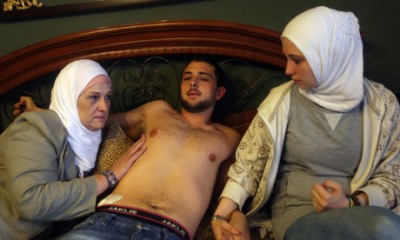
The Syrian-British couple and their three children were this week forced to flee their home in the Syrian city of Homs after their eldest son was shot amid a brutal government crackdown on pro-democracy demonstrators.
Fearing that the bullet wound would mark him out as an opposition activist, the family packed a few bags and left the only country the children have known.
Lifting his T-shirt to show two dressed wounds where the bullet passed through him, Danny, 22, explains how he was wounded.
It was Saturday night and Danny was standing in the street talking to a friend about getting food and medication into Hama – another city that has become a focus of dissent against the regime of President Bashar al-Assad.
A car drew up alongside the two men, and a passenger – believed to be a pro-government militiaman – opened fire.
“I thought: am I dying? Will my legs still work? And then it hurt, and bled, like hell,” said Danny.
Until six months ago, Danny, a business management student, paid little thought to politics. That changed when a group of children, inspired by the uprisings in Tunisia and Egypt, were arrested after writing anti-government graffiti in the southern city of Deraa.
Hundreds of people in Homs turned out to protest and as the movement grew, Danny became a leading activist and organised deliveries of food and medication to needy neighbourhoods.
In response, the government unleashed troops, police and pro-regime militiamen against unarmed protesters. Over the months, Homs has been transformed from a cosmopolitan hub into a dissident city under occupation.
Gunfire rings out every day. When there is silence the city’s inhabitants grew nervous, waiting for more house-to-house raids.
“There are identity checks across the city, neighbours leaving or [staying] inside with the shutters down,” says Akram. Rumours abound of mass graves and bodies shoved in binbags.
The first death Danny witnessed was that of a 13-year-old boy shot in the head next to him. Since then, he says, 14 of his friends have been killed. Last month, one of the family’s relatives, Adnan Abdul Dayem, 27, was shot dead.
“For months I have been prepared for the fact it could be me, but I will not let my friends die for nothing,” Danny says.
He affects an air of nonchalance, but his worldly air falters when asked if he has become used to seeing death. Dragging on a cigarette, he pauses, then says: “No. No. I just try not to think about it.”
Danny spent his time gathering food, money and medication for fellow protesters. In one video posted on YouTube he can be seen dragging a wounded man to shelter when security forces opened fire after protesters tried to speak to a UN humanitarian delegation.
His father Akram described sitting up until 4 or 5am every morning, a fog of cigarette smoke around him, waiting for his son to come home safely.
At first protesters were merely calling for reforms. But the brutality of the regime’s response has caused them to harden their line: in some areas, people have started to retaliate, taking up weapons and returning fire on the security forces.
“We watch security forces shoot at our children as if they are hunting; as if our sons’ lives mean nothing,” says Helen.
Packing up and leaving home was no easy decision. Syria has been home since the 1990s when Helen, originally from Cambridge, moved there after converting to Islam and marrying Akram.
But six months of violence has caused almost intolerable stress for the family.
“I watched Danny transform from a boisterous fun-loving boy to a quiet, withdrawn man,” says Helen.
Sammy, 14, says he “put on loud music and pretended it was quiet outside” so he could study for exams. Jannah, 19, hid in her room with books or took refuge in the bathroom. Helen rose at 5am, cigarette and Nescafé at hand, logging her fears in a diary.
For the family, Danny’s shooting was the last straw: wounded protesters have been dragged from their beds and arrested, so after a quick scan and five stitches on each wound, he discharged himself from hospital. Meanwhile, the rest of the family packed up their house. Jannah grabbed her laptop, Sammy took some colognes given to him by friends.
All of the family are adamant they will – one day – return to a democratic Syria. “People are not going to stop,” Akram says. “We know that soon the country will be freed.”

Leave a Reply
You must be logged in to post a comment.